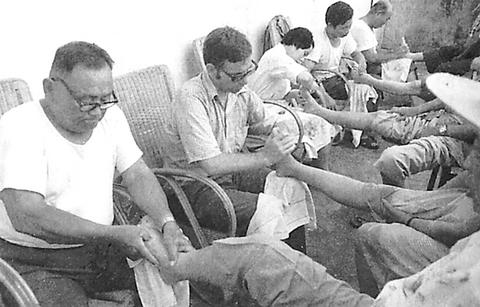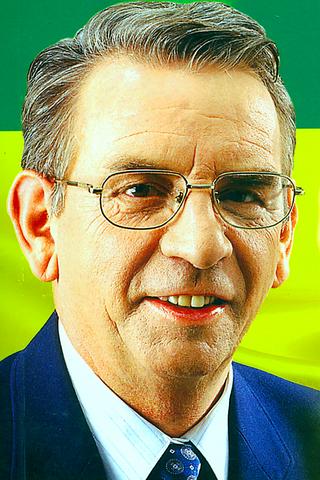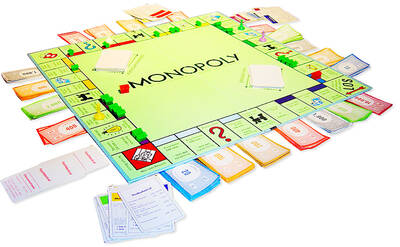Father Josef Eugster may not be the best evangelist for converting people to Christianity. He may not have touched the hearts of millions of Taiwanese, but he's easily Taiwan's most famous and influencial foreign priest for having touched people's feet. He declares his pioneering foot massage in Taiwan to be "God's gift."
"This is Chang-pin Catholic Church, I'm Father Wu Ro-shih," 62-year-old Eugster said in fluent Mandarin when answering a phone call from the Taipei Times. Actually, Father Eugster's accent is more Taiwanese because the first language he learned when arriving in Taiwan 30 years ago was Taiwanese.

PHOTO COURTESY OF FATHER JOSEF EUGSTER
Back then, a shy young man from the Swiss village of Berneck came to Taiwan's east coast town of Taitung, where people pray in shrines and Amis Aborigines hunt and hold ceremonies by the sea. The only plan he had in mind was to serve God. But how?

PHOTO COURTESY OF COSMAX PUBLISHING
"It is really difficult to try to preach to Taiwanese!" Father Eugster said. He recalled that during his first few years in Taitung, his sermons always made people doze off. "I prayed to God, asking him to give me a good method for preaching, and then He made me sick," Eugster said. Now he says he's grateful that he was troubled by arthritis -- if he weren't, he would not have read the book about reflexology and began massaging first his own and then other people's feet.
When an old man was leaving the church following mass, he looked uninterested in my sermon and complained of a headache. "I grabbed his feet, saying `please give me five minutes,'" Eugster said. "I showed him, `here is a reflex area for your headache' and began massaging it for him." Like that, Eugster found his new method of preaching. Unlike other Western priests, who often bring rice or flour to remote villages, Father Eugster brings his hands.
His Taitung Catholic church has been packed ever since. There are often even hundreds of people lined up at the door of the church at midnight. One time, Eugster was too exhausted from doing massage and fell ill with nephritis. "I was hospitalized and couldn't do any massage, so I asked them to go to the beach to find pebbles to step on," Eugster said. This became the origin of "pebble paths" meandering through many of Taiwan's parks.
"Ninety percent of the people came to the church just for their health problems, only 10 percent were interested in the spiritual," Eugster said. But he never gives up hope. "Maybe in 10, 20 years, they will want to listen to God's words," he said.
Fame has brought its share of trouble. In 1980, people abusing his name began prescribing medicine. His taxes were checked and the Department of Health charged him with practicing medicine without a doctor's certificate. "I even received calls [from people] threatening to kill me," he said.
Eugster took an eight-month leave to study in Jerusalem. "I was actually suffering from neurasthenia and couldn't sleep at nights. I needed a break to find myself again," he said.
As foot massage became popular in urban areas, with his name and picture widely printed on clinics' signboards, Father Eugster returned to Taiwan's remote villages. Back from Jerusalem, he was transferred to Chang-ping, a small village at the border between Hualien and Taitung, distancing himself from money and fame.
"This is the most beautiful place in the world, with mountains and the sea. I have a farm for growing vegetables and I often go swimming in the sea, and sometimes fishing," he said.
Now with his schedule packed with speaking engagements, visiting a circuit of churches Amis tribes and practicing massage, Eugster has managed to find some time to learn the Amis language.
Surprisingly, even after 23 years of having massaged celebrities and politicians, his charge remains a modest NT$350 for a half-hour massage, lower than in most clinics.
Despite his fame, Father Josef Eugster remains a simple man. "Two months ago, I was given an air-conditioner, donated by disciples. It was my first air-conditioner," Eugster said.

With one week left until election day, the drama is high in the race for the Chinese Nationalist Party (KMT) chair. The race is still potentially wide open between the three frontrunners. The most accurate poll is done by Apollo Survey & Research Co (艾普羅民調公司), which was conducted a week and a half ago with two-thirds of the respondents party members, who are the only ones eligible to vote. For details on the candidates, check the Oct. 4 edition of this column, “A look at the KMT chair candidates” on page 12. The popular frontrunner was 56-year-old Cheng Li-wun (鄭麗文)

“How China Threatens to Force Taiwan Into a Total Blackout” screamed a Wall Street Journal (WSJ) headline last week, yet another of the endless clickbait examples of the energy threat via blockade that doesn’t exist. Since the headline is recycled, I will recycle the rebuttal: once industrial power demand collapses (there’s a blockade so trade is gone, remember?) “a handful of shops and factories could run for months on coal and renewables, as Ko Yun-ling (柯昀伶) and Chao Chia-wei (趙家緯) pointed out in a piece at Taiwan Insight earlier this year.” Sadly, the existence of these facts will not stop the

Oct. 13 to Oct. 19 When ordered to resign from her teaching position in June 1928 due to her husband’s anti-colonial activities, Lin Shih-hao (林氏好) refused to back down. The next day, she still showed up at Tainan Second Preschool, where she was warned that she would be fired if she didn’t comply. Lin continued to ignore the orders and was eventually let go without severance — even losing her pay for that month. Rather than despairing, she found a non-government job and even joined her husband Lu Ping-ting’s (盧丙丁) non-violent resistance and labor rights movements. When the government’s 1931 crackdown

The first Monopoly set I ever owned was the one everyone had — the classic edition with Mr Monopoly on the box. I bought it as a souvenir on holiday in my 30s. Twenty-five years later, I’ve got thousands of boxes stacked away in a warehouse, four Guinness World Records and have made several TV appearances. When Guinness visited my warehouse last year, they spent a whole day counting my collection. By the end, they confirmed I had 4,379 different sets. That was the fourth time I’d broken the record. There are many variants of Monopoly, and countries and businesses are constantly